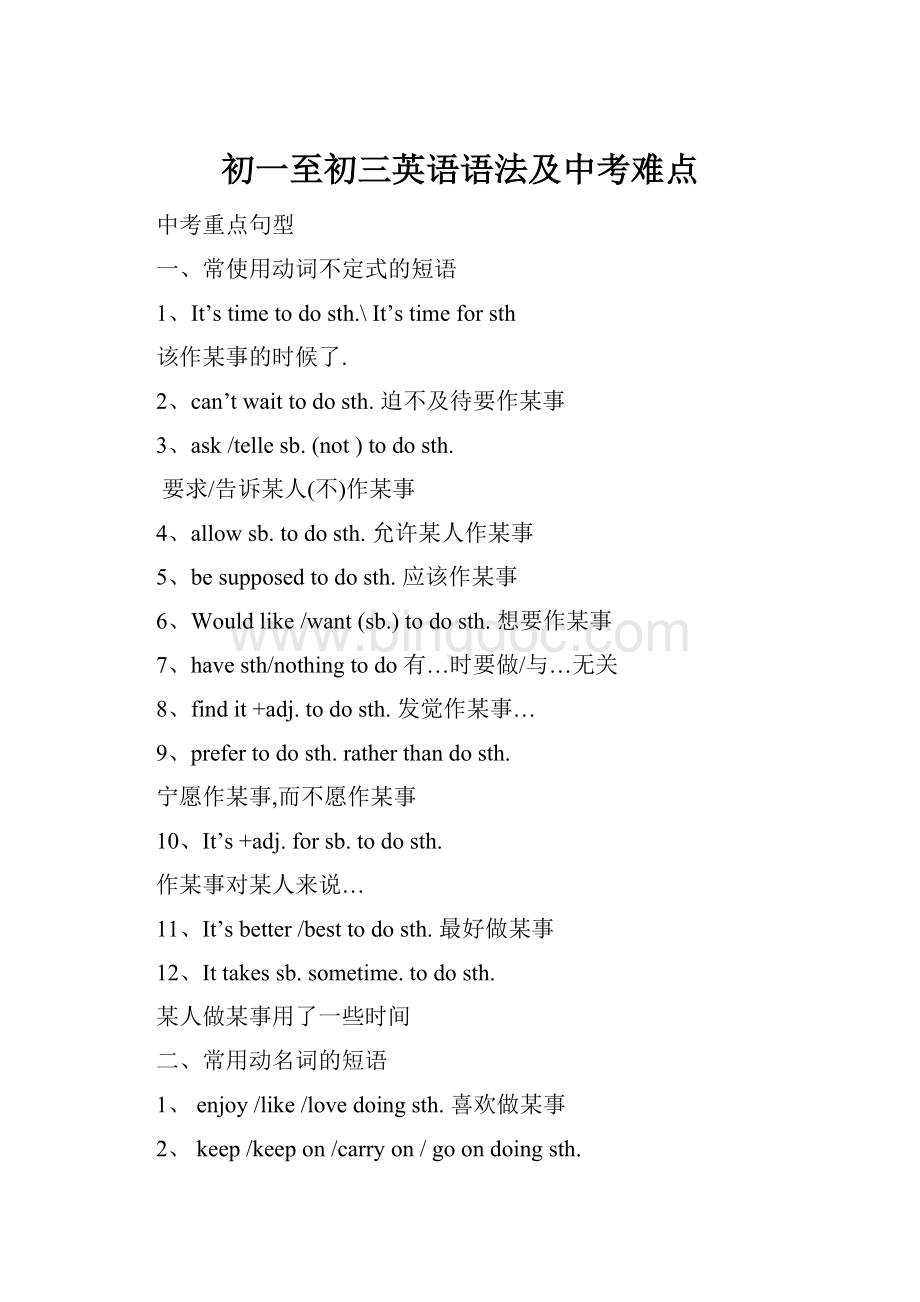初一至初三英语语法及中考难点.docx
《初一至初三英语语法及中考难点.docx》由会员分享,可在线阅读,更多相关《初一至初三英语语法及中考难点.docx(28页珍藏版)》请在冰点文库上搜索。

初一至初三英语语法及中考难点
中考重点句型
一、常使用动词不定式的短语
1、It’stimetodosth.\It’stimeforsth
该作某事的时候了.
2、can’twaittodosth.迫不及待要作某事
3、ask/tellesb.(not)todosth.
要求/告诉某人(不)作某事
4、allowsb.todosth.允许某人作某事
5、besupposedtodosth.应该作某事
6、Wouldlike/want(sb.)todosth.想要作某事
7、havesth/nothingtodo有…时要做/与…无关
8、findit+adj.todosth.发觉作某事…
9、prefertodosth.ratherthandosth.
宁愿作某事,而不愿作某事
10、It’s+adj.forsb.todosth.
作某事对某人来说…
11、It’sbetter/besttodosth.最好做某事
12、Ittakessb.sometime.todosth.
某人做某事用了一些时间
二、常用动名词的短语
1、enjoy/like/lovedoingsth.喜欢做某事
2、keep/keepon/carryon/goondoingsth.
继续做某事
3、feellikedoingsth.想要做某事
4、practisedoingsth.练习作某事
5、giveupdoingsth.放弃作某事
6、begoodat=dowellin\ondoingsth.擅长作某事
7、payattentiontodoingsth.注意作某事
8、whatabout/howaboutdoingsth.
….怎么样(好吗)?
9、Thankyoufordoingsth.为…感谢某人
10、minddoingsth.介意作某事
11、beusedfordoingsth./beusedtodosth.、
被用来作某事
12、spend…(in)doingsth.花时间作某时
13、bebusydoing/withsth.忙于作某事
14、finishdoingsth.作完某时
15、lookforwardtodoing.盼望做某事
16、preferdoingsth.todoingsth.喜欢…胜过…
17、be/getusedtodoingsth.习惯作某事
18、keep/stop/preventsb.fromdoingsth.
阻止某人作某事
三、省略动词不定式的短语
1、一看二听三使役
see/hear/feel/notice/lookat/listentosb.dosth.
看见/听见/感觉/注意某人作某事
make/let/havesb.dosth.使/让某人做某事
2、helpsb.(to)dosth/withsth.帮助某人作某事
3、hadbetter(not)dosth.最好(不)做某事
4、Whydon’tyou/notdosth.为什么不作某事
5、Would/Will/Couldyouplease(not)dosth.
请你(不)作某事好吗?
四、同义词比较
1、stoptodosth.停下正在做的事去作另一件事
stopdoingsth.停止正在作的事
eg.Whentheteachercameintotheclassroom,thestudentsstoppedtalking.Afterheworkedforanhour,hestoppedtohavearest.
2、forget/remembertodosth.
忘记/记得要去作某事
forget/rememberdoingsth.
忘记记得曾经做过某事
eg.Pleaseremembertobringmybooktoschool.
Irememberdoingmyhomework
3、usedtodosth.过去常常作某事
beusedtodosth.被用来作某事
beusedtodoingsth.习惯于作某事
eg.Myfatherusedtosmoke.
Woodisusedtomakepaper.
Iamusedtogettingupearly.
4、So+be/助动词/情态动词+主语
…也一样
So+主语+be/助动词/情态动词
是呀,表示赞同别人的观点
Neither+be/助动词/情态动词+主语
…也不一样(用于否定句)
eg.HehasbeentoBeijing.SohaveI.
It’safineday.Soitis.
Shedoesn’tlikeeggs.NeitherdoI.
5、too…todosth.太…而不能…
so+adj./adv+that(从句)如此…以致…
such+(a/an+adj.)+n.+that(从句)
如此…以致…
(not)enough(forsb.)todosth.
(对某人来说)做某事(不)够
eg.Theboyistooyoungtogotoschool.
Theboyissoyoungthathecan’tgotoschool.
Heissuchayoungboythathecan’tgotoschool.
Theboyisnotoldenoughtogotoschool.
五、常考知识点
1、keep+adj.保持…状态
keep(sb.)doingsth.
继续做某事/使某人老是做某事
eg.Everyoneshouldkeepourclassroomclean.
It’stoolate,buthestillkeepsworking.
Lilyalwayskeepsuswaitingforher.
2、make+sb.+n.使某人成为
make+sb.+adj.使某人…
makesb.dosth.使某人做某事
Sb.bemadetosth.某人被迫做某事
eg.WemadePeterourmonitor.
Booksmakeushappy.
Heoftenmakesmelaugh.
Theworkersweremadetowork12hoursaday.
3、Idon’tthinkthat我认为…不
eg.Idon’tthinkyouareright.
4、It’s/was/hasbeen+sometime+since+一般过去时…自从…以来有多久了
eg.Ithasbeentwoyearssincewemetlasttime.
6、Whatdoyoumeanby?
=Whatdoes..mean?
=whatisthemeaningof...?
是什么意思?
eg.Whatdoyoumeanby“computer”?
=Whatdoes“computer”mean?
=whatisthemeaningof"computer"?
7、Whatdoyouthinkof…/Howdoyoulike…?
你认为…怎么样?
eg.Whatdoyouthinkofthisfilm/Howdoyoulikethisfilm?
8、Whatis/was/will…belike?
..怎么样?
eg.Whatistheweatherlike?
Whatwillthelifeinthefuturebelike?
9、It’ssaid/reportedthat…据说/据报道
It'swellknownthat众所周知
It'sthoughtthat大家认为
eg.It’ssaidthatthepopulationofthewordwouldbe6billionin2050.
10、oneofthe+形容词最高级+名词复数
…其中之一
eg.ShanghaiisoneofthebiggestcitiesinChina.
11、neither…nor…既不…也不(两者都不)
either…or…要么…要么/或者…或者/不是…就是
notonly…butalso…不但…而且
以上三个词做主语时,要用就近原则
eg.NeitheryounorhehasbeentotheUSA.
Eitherheoryougotothepark.
Notonlymymotherbutalsomyfatherisateacher.
neitherof两者都不
eitherof两者选一
noneof没有一个
以上三个做主语时,谓语动词用单数
Allof全部Bothof两者都
以上二个做主语时,谓语动词用复数
12、比较级+than+anyother+名词单数
…比其余任何一个…
比较级+than+theother+名词复数
eg.Shanghaiisbiggerthananyothercity=shanghaiisbiggerthantheothercitiesinChina.
13、When(当…的时候),if(如果),assoonas(一…就),until(直到…才),unless(除非/如果…不)这几个词引导的时间或条件状语从句时,主句要用一般将来时.
从句一般现在时
eg.Iwillcallyouwhenhecomes.
Ifitdoesn’traintomorrow,wewillhaveapicnic.
AssoonasIgettoBeijing,I’llcometoseeyou.
Hewon’tgotobeduntilhisparentscomeback.
Unlessyouworkhard,youwon’tcatchupwithothers.
希望我的答案对你有帮助
初一的语法知识包括:
主要掌握几种时态
1,一般现在时
2,一般过去时
3,一般将来时
4,现在进行时
还有几种词
1,名词
2,代词
3,形容词
4,动词
5,冠词
初一英语语法
一、词法
1、名词
A)、名词的数
我们知道名词可以分为可数名词和不可数名词,而不可数名词它没有复数形式,但可数名词却有单数和复数之分,复数的构成如下:
一)在后面加s。
如:
fathers,books,Americans,Germans,apples,bananas
二)x,sh,ch,s,tch后加es。
如:
boxes,glasses,dresses,watches,wishes,faxes
三)1)以辅音字母加y结尾的变y为i再加es 如:
baby-babies,family-families,duty-duties,comedy-comedies,documentary-documentaries,story-stories
2)以元音字母加y结尾的直接加s。
如:
day-days,boy-boys,toy-toys,key-keys,ways
四)以o结尾加s(外来词)。
如:
radios,photos,但如是辅音加o的加es:
如:
tomatoes西红柿,potatoes马铃薯
五)以f或fe结尾的变f为v再加es(s)。
如:
knife-knives,wife-wives,half-halves,shelf-shelves,leaf-leaves,yourself-yourselves
六)单复数相同(不变的)有:
fish,sheep,deer鹿子,Chinese,Japanese
七)一般只有复数,没有单数的有:
people,pants,shorts,shoes,glasses,gloves,clothes,socks
八)单词形式不变,既可以是单数也可以是复数的有:
police警察局,警察,class班,同学,family家,家庭成员
九)合成的复数一般只加主要名词,多数为后一个单词。
如:
actionmovie-actionmovies,penpal-penpals;但如果是由man或woman所组成的合成词的复数则同时为复数。
如:
mandoctor-mendoctors,womanteacher-womenteachers
十)有的单复数意思不同。
如:
fish鱼fishes鱼的种类,paper纸papers报纸,卷子,论文,work工作works作品,工厂,glass玻璃glasses玻璃杯,眼镜, orange桔子水oranges橙子,light光线lights灯,people人peoples民族, time时间times时代,次数,chicken鸡肉 chickens小鸡
十一)单个字母的复数可以有两种形式直接加s或’s。
如:
Is(I’s),Ks(K’s)。
但如是缩略词则只加s。
如:
IDs,VCDs,SARs
十二)特殊形式的有:
child-children,man-men,woman-women,foot-feet,mouse-mice,policeman-policemen,Englishman-Englishmen
B)名词的格
当我们要表示某人的什么东西或人时,我们就要使用所有格形式。
构成如下:
一)单数在后面加’s。
如:
brother’s,Mike’s,teacher’s
二)复数以s结尾的直接在s后加’,如果不是以s结尾的与单数一样处理。
如:
Teachers’Day教师节,classmates’;Children’sDay六一节,Women’sDay三八节
三)由and并列的名词所有时,如果是共同所有同一人或物时,只加最后一个’s,但分别拥有时却分别按单数形式处理。
如:
MikeandBen’sroom迈克和本的房间(共住一间),Mike’sandBen’srooms迈克和本的房间(各自的房间)
2、代词
项目人称代词物主代词指示代词反身代词
人称主格宾格形容词名词性
第一人称单数Imemyminemyself
复数weusouroursourselves
第二人称单数youyouyouryoursyourself
复数youyouyouryoursyourselves
第三人称单数sheherherhersherself
hehimhishishimself
itititsitsthisthatitself
复数theythemtheirtheirsthesethosethemselves
3、动词
A)第三人称单数
当动词是第三人称单数时,动词应该像名词的单数变动词那样加s,如下:
一)一般在词后加s。
如:
comes,spells,waits,talks,sees,dances,trains
二)在x,sh,ch,s,tch后加es。
如:
watches,washes,wishes,finishes
三)1)以辅音字母加y结尾的变y为i再加es。
如:
study-studies,hurry-hurries,try-tries
2)以元音字母加y结尾的直接加s。
如:
plays,says,stays,enjoys,buys
四)以o结尾加es。
如:
does,goes
五)特殊的有:
are-is,have-has
B)现在分词
当我们说某人正在做什么事时,动词要使用分词形式,不能用原形,构成如下:
一)一般在后加ing。
如:
spell-spelling,sing-singing,see-seeing,train-training,play-playing,hurry-hurrying,watch-watching,go-going,do-doing
二)以不发音e的结尾的去掉e再加ing。
如:
dance-dancing,wake-waking,take-taking,practice-practicing,write-writing,have-having
三)以重读闭音节结尾且一个元音字母+一个辅音字母(注意除开字母组合如show–showing,draw-drawing)要双写最后的辅音字母再加ing。
如:
put-putting,run-running,get-getting,let-letting,begin-beginning
四)以ie结尾的变ie为y再加ing。
如:
tie-tying系 die-dying死 lie-lying位于
4、形容词的级
我们在对两个或以上的人或物进行对比时,则要使用比较或最高级形式。
构成如下:
一)一般在词后加er或est(如果是以e结尾则直接加r或st)。
如:
greater-greatest,shorter–shortest,taller–tallest,longer–longest,nicer-nicest,larger-largest
二)以重读闭音节结尾且1个元音字母+1个辅音字母(字母组合除外,如few-fewerfewest)结尾的双写结尾的辅音再加er/est。
如:
big-biggerbiggest,red-redderreddest,hot-hotterhottest
三)以辅音字母+y结尾的变y为i加er/est。
如:
happy-happierhappiest,sorry-sorriersorriest,friendly-friendlierfriendliest(morefriendlymostfriendly),busy-busierbusiest,easy-easiereasiest
四)特殊情况:
(两好多坏,一少老远)
good/well-betterbestmany/much-moremost bad/ill–worseworst
little-lessleastold-older/elderoldest/eldestfar-farther/furtherfarthest/furthest
5、数词(基变序,有规则;一、二、三,自己背;五、八、九、十二;其它后接th;y结尾,变为i,eth跟上去。
)first,second,third;fifth,eighth,ninth,twelfth;seventh,tenth,thirteenth,hundredth;twenty-twentieth,forty-fortieth,ninety-ninetieth
二、句式
1.陈述句
肯定陈述句a)Thisisabook.(be动词)
b)Helooksveryyoung.(连系动词)
c)Iwantasweatlikethis.(实义动词)
d)Icanbringsomethingstoschool.(情态动词)
e)There’sacomputeronmydesk.(Therebe结构)
否定陈述句a)Thesearen’ttheirbooks.b)Theydon’tlooknice.
c)Katedoesn’tgotoNo.4MiddleSchool.d)Katecan’tfindherdoll.
e)Thereisn’tacathere.(=There’snocathere.)
2.祈使句
肯定祈使句a)Pleasegoandasktheman.b)Let’slearnEnglish!
c)Comein,please.
否定祈使句a)Don’tbelate.b)Don’thurry.
3.疑问句
1)一般疑问句a)IsJimastudent?
b)CanIhelpyou?
c)Doesshelikesalad?
d)DotheywatchTV?
e)Isshereading?
肯定回答:
a)Yes,heis.b)Yes,youcan.c)Yes,shedoes.d)Yes,theydo.e)Yes,sheis.
否定回答:
a)No,heisn’t.b)No,youcan’t.c)No,shedoesn’t.d)No,theydon’t.e)No,sheisn’t.
2)选择疑问句Isthetablebigorsmall?
回答It’sbig./It’ssmall.
3)特殊疑问句
① 问年龄HowoldisLucy?
Sheistwelve.
② 问种类 Whatkindofmoviesdoyoulike?
Ilikeactionmoviesandcomedies.
③ 问身体状况Howisyouruncle?
Heiswell/fine.
④ 问方式Howdo/canyouspellit?
L-doubleO-K.
Howdowecontactyou?
Mye-mailaddressiscindyjones@.
⑤ 问原因 Whydoyouwanttojointheclub?
⑥ 问时间What’sthetime?
(=Whattimeisit?
)It’saquartertotena.m..
Whattimedoyouusuallygetup,Rick?
Atfiveo’clock.